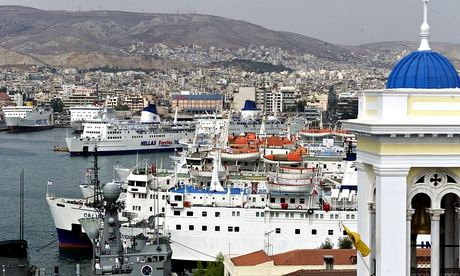Helena Smith in Athens The Guardian, Saturday 1 March 2014
Greece has suffered the second biggest property crash in the EU since the debt crisis began
Piraeus harbour in Athens: some estate agents say prices in the city have halved in four years. Photograph: Louisa Gouliamaki/EPA
There is constant motion on the second floor of 24 Kanari Street. At the Athens office of Remax, Greece's largest property company, clients come and go, agents slip in and out and brokers pace the corridors barking into mobile phones.
For Christos Vergos, it means a frenetic work schedule of 12-hour days and a client base that is ever growing.
"At all hours, people call in wanting to sell or wanting to rent or wanting to expand because places now are so much cheaper," says the estate agent in a conference room overlooking Kolonaki Square.
In a market that has hit rock bottom in the maelstrom of Greece's financial meltdown, basement flats are selling for as little as €5,000 (£4,150) in the less salubrious parts of Athens. On the isle of Mykonos, cash-strapped Greek celebrities have been selling luxury villas for a song.
But Vergos prefers to focus on another figure. "Last year, there were just 3,600 sales in all of Athens – I repeat, all of Athens."
Greece's social and economic crash is reflected in its property slump. Data released by Eurostat, the EU's statistics agency, earlier this month showed that the country had suffered the second steepest decline in house prices after Croatia, the bloc's newest member.
Since the outbreak of the Greek debt crisis four years ago, property values nationwide have dropped by around 32%, according to the Bank of Greece; estate agents contacted by the Guardian estimated the decline at nearer 50%.
"At their peak, in 2005, in the euphoria of the Olympic Games, there were 250,000 sales in Athens," said the property analyst Christos Bletas. "The lack of interest displayed last year, partly because of the incredible rise in property taxes, hasn't been experienced since the second world war."
Owners may be desperate to offload, but in a climate of pervasive uncertainty there are few who want to buy.
With over a third of households unable to meet tax obligations, four out of 10 Greeks recently told a Kapa Research poll they would willingly hand over properties to the state to fulfil future payments; one in three, unable to keep up mortgage repayments, feared their homes would be confiscated in 2014.
The situation, says Bletas, is so dire that home ownership – at nearly 87% the highest in the EU – has become cause for black humour. "The joke now doing the rounds is: if you want to punish your child, you threaten to pass on property to them," he said. "Greeks traditionally have always regarded property as a secure investment. But now it has become a huge millstone, given that the tax burden has increased sevenfold in the past two years alone."
At no time has there been such a glut of property on the market, according to the Hellenic Property Federation (Pomida), which reckons more than 500,000 property owners want to sell. Across Greece, about 300,000 residences are believed to be empty.
"For northern Europeans who want to buy a holiday home or a plot to develop for business, it's a golden opportunity," says Stratos Paravias, Pomida's president. "The tax burden is not so big when you have one property; it is when [like most Greeks] you have two or more."
With about 500 properties on his books, Manolis Akalestos, who runs the Scopas estate agency on the island of Paros, confirms that view. In the past year he has been deluged with requests for holiday homes from foreigners, many encouraged by the drop in prices and a new law granting non-EU citizens residence permits.
"In 2013, I had my best year yet, with 90% of all sales being made to people overseas," he said. "Before, property prices were incredibly inflated because every Greek was able to get a cheap loan after our entry into the eurozone," he explained. "And foreigners took a step back. Now that prices have calmed down and returned to natural levels, they are coming back with a vengeance."
With the market's stagnation also being blamed for the lack of liquidity in Greece, politicians across the board are quietly hoping that non-Greeks will help save the day.
"In Crete, where I am from, a lot of investment went into housing for foreigners, and it was the first to collapse," said Giorgos Stathakis, the shadow development minister for the radical left main opposition Syriza party. "Foreigners stopped buying, or started selling off their houses, when the crisis began in 2010.
"We are in a very peculiar situation where prices are falling but the market isn't moving. If the recession eases in Europe, and foreigners start to return, it would be part of the solution to one of Greece's biggest problems."
Home ownership in Greece 'a sick joke' as property market collapses | World news | The Guardian
![The [Greek] European Tragedy](https://blogger.googleusercontent.com/img/b/R29vZ2xl/AVvXsEiWKI5s90SFm1wWTk6bs4p7CgslaC2SnYPsrZhb-B-smOufNNCSxCvpBLI9hOB-LsXZjir_PNmEiMk2-E62F3xkg96IoC6QFAaZAnPRTVH340IN9WBRmWJqPkjWlgyRj3zpALp7h6hvA58/s920/GkBack_new.jpg)
